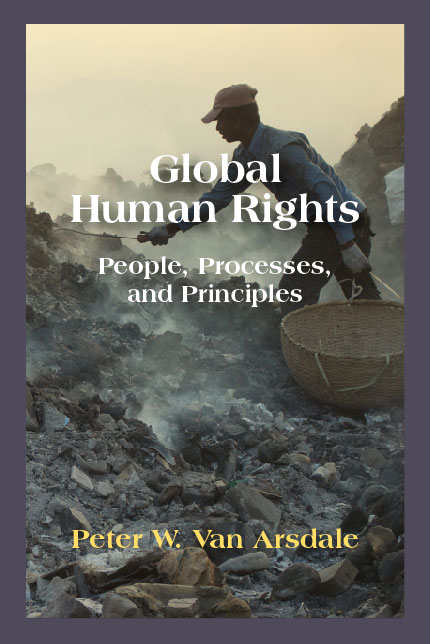“I like the compact size of the book as a way to introduce students to human rights in an interdisciplinary context.” — Josephine Ryan, University of Texas at Arlington
“This text is concise, dense, culturally and theoretically rich, engaging, and well written.” — Christine Hippert, University of Wisconsin, La Crosse
“Peter Van Arsdale has gone far beyond just doing his own ethical work, especially with vulnerable subjects such as refugees and torture survivors. He has enlarged the theoretical depth for his practicing colleagues. He has the ability to capture the essence of broad ideas.” — Jody Glittenberg, University of Arizona

117 pages, $21.95 list
1-4786-3294-1
978-1-4786-3294-8
© 2017
paperback
eBook availability
Similar Titles
Global Human Rights
People, Processes, and Principles
Peter Van Arsdale’s four decades of worldwide applied research and community outreach as a cultural anthropologist have involved water resource development, mental health, refugee resettlement, humanitarian assistance, and human rights. With one foot in the university, he always has kept the other foot in the field. In this brief, well-crafted volume, he synthesizes and grapples with key rights debates as well as human rights injustices on four continents.
Thoughtful, original, and pragmatic, Van Arsdale opens with a “Tree of Rights” metaphor to demonstrate that rights are continually growing and evolving. From its branches come new rights, changes in the perception of rights, and the reframing of rights crossculturally. Following chapters focus on fundamental human rights: the right to clean water, sanitation, and food security; the right to be free from violence, genocide, and ethnic cleansing; and the right to dignity and respect. At-risk groups covered in the book include LGBT communities, children, refugees, and victims of war. Throughout, praxis—the meaningful intersection of theory, ethics, and practice—is emphasized. Chapter coverage is enhanced by complementary and compelling “Agency Action” and “Champion” sidebars.
In closing, Van Arsdale challenges readers to embrace his “Theory of Obligation,” which maintains that one must assist those whose rights have been abused, when requested and when expertise and resources permit.
Thoughtful, original, and pragmatic, Van Arsdale opens with a “Tree of Rights” metaphor to demonstrate that rights are continually growing and evolving. From its branches come new rights, changes in the perception of rights, and the reframing of rights crossculturally. Following chapters focus on fundamental human rights: the right to clean water, sanitation, and food security; the right to be free from violence, genocide, and ethnic cleansing; and the right to dignity and respect. At-risk groups covered in the book include LGBT communities, children, refugees, and victims of war. Throughout, praxis—the meaningful intersection of theory, ethics, and practice—is emphasized. Chapter coverage is enhanced by complementary and compelling “Agency Action” and “Champion” sidebars.
In closing, Van Arsdale challenges readers to embrace his “Theory of Obligation,” which maintains that one must assist those whose rights have been abused, when requested and when expertise and resources permit.
Reactions
Introduction: Night Doctors and Night Commuters
What Are "Global Human Rights"? / People, Processes, and Principles / Passionaries, Case Studies, and Activism
1. A Metaphor for Understanding: The "Tree of Rights"
Essential Principles / Structural Violence / The Cambodian Doctor / Other Important Issues
2. Provision Rights: Water, Sanitation, and Food Security
The Necessities of Life / Case #1: Kibera and Global WASHES / Case #2: Food Insecurity in Somalia / Case #3: Water Scarcity at Canyon de Chelly / What's Being Done
3. Fragile Bonds: Societal Violence and Warfare
Violence Is Personal / Case #1: Ethiopia's Red Terror / Case #2: Refugees in New Guinea / Case #3: India's "Unknown Insurgency" / What's Being Done
4. Crimes against Humanity: Genocide, Ethnocide, and Ethnic Cleansing
Behind Nazi Lines / Case #1: Cambodia's Killing Fields / Case #2: Genocide in Darfur / Case #3: Bosnia's Omarska Concentration Camp / What's Being Done
5. Invisible Barriers: Children's Rights
An Image of God / Case #1: Child Abuse, Neglect, and Sex Trafficking in the United States / Case #2: The Chibok Girls and Boko Haram / Case #3: Europe's Missing Refugee Children / What's Being Done
6. Obligated Actions: Moral and Material Possibilities
An Obligation to Act / Violence: The Worldwide Situation / Champions and Passionaries / The Next Frontier: Gay Rights / What's Being Done / Just Do It!
Glossary of Acronyms
What Are "Global Human Rights"? / People, Processes, and Principles / Passionaries, Case Studies, and Activism
1. A Metaphor for Understanding: The "Tree of Rights"
Essential Principles / Structural Violence / The Cambodian Doctor / Other Important Issues
2. Provision Rights: Water, Sanitation, and Food Security
The Necessities of Life / Case #1: Kibera and Global WASHES / Case #2: Food Insecurity in Somalia / Case #3: Water Scarcity at Canyon de Chelly / What's Being Done
3. Fragile Bonds: Societal Violence and Warfare
Violence Is Personal / Case #1: Ethiopia's Red Terror / Case #2: Refugees in New Guinea / Case #3: India's "Unknown Insurgency" / What's Being Done
4. Crimes against Humanity: Genocide, Ethnocide, and Ethnic Cleansing
Behind Nazi Lines / Case #1: Cambodia's Killing Fields / Case #2: Genocide in Darfur / Case #3: Bosnia's Omarska Concentration Camp / What's Being Done
5. Invisible Barriers: Children's Rights
An Image of God / Case #1: Child Abuse, Neglect, and Sex Trafficking in the United States / Case #2: The Chibok Girls and Boko Haram / Case #3: Europe's Missing Refugee Children / What's Being Done
6. Obligated Actions: Moral and Material Possibilities
An Obligation to Act / Violence: The Worldwide Situation / Champions and Passionaries / The Next Frontier: Gay Rights / What's Being Done / Just Do It!
Glossary of Acronyms